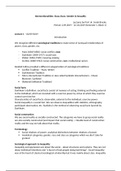Intersectionalities: Class, Race, Gender & Sexuality
Lectures by Prof. dr. Sarah Bracke
Period: 2.09.2019 – 22.10.2019 (Semester 1, Block 1)
Lecture 1 – 02/09/2019
Introduction
We recognize different sociological traditions to make sense of (unequal) relationships of
power, class, gender, etc:
- Marx (1818-1883): social conflict, class
- Durkheim (1858-1917): social facts
- Weber (1864-1920): meaning-making
- Du Bois (1868-1963): social construction, race. Institutional racism.
Randall Collins provided a different categorization of sociological traditions:
Conflict Tradition – Marx, Weber
Durkheimian Tradition
Micro-interactionist Tradition or also called Symbolic Interactionism – Mead,
Blummer, Garfinkel
(Rational/Utilitarian Tradition)
Social facts
Durkheim’s definition: social facts consist of manners of acting, thinking and feeling external
to the individual, which are invested with a coercive power by virtue of which they exercise
control over him/her.
Characteristics of social facts: observable, external to the individual, coercive power.
Social inequality is a social fact. We can observe inequalities with statistics, ethnography,
participant observation, etc. Statistics is the method of observing social facts favored by
Durkheim.
Social construction
We see social reality as socially constructed. The categories we have to grasp social reality
are also socially constructed (and impact that social reality) -> Double level of construction:
reality and the way we talk about that reality.
Terminology
Social relations of power: analytical distinctions between relations of power
Analytical categories: gender, race and class as categories which we don’t take for
granted
Sociological approach to inequality
Inequality and oppression are about the social – about structures and systems. They are not
about individual intentions and “a bunch of bad people doing bad things”. Social inequality
was at the heart of classical sociological scholarship but it was mainly about class. Inequality
,= class inequality (stratification of society). This has broadened with Du Bois who also
focused on race and later on, from the second half of the 20th century, expanded to gender
and sexuality.
Resistance to fact of social inequality
Pierre Bourdieu: “The particular difficulty of sociology comes from the fact that it teaches
things that everybody knows in a way, but which they don’t want to know or cannot know
because the law of the system is to hide those things from them.”
We all have everyday knowledge of social, class, gender, race and other social facts. But we,
as sociologists, have to take it to an analytical level -> there is something specific to the
discipline of sociology.
This is at odds with neoliberal reasoning: “There is no such thing as society”. A different kind
of dynamic developed in contrast to “neoliberal” reasoning in which the idea of meritocracy
is based on:
- Epistemological and methodological individualism (social systems)
- Essentialism (social construction)
Sociological Imagination
C. Wright Mills: “The sociological imagination enables us to grasp history and biography and
the relations between the two within society. That is its task and its promise. To recognize
this task and this promise is the mark of the classic social analyst.” “No social study that
does not come back to the problems of biography, of history and of their intersections
within a society has completed its intellectual journey.”
WHAT is at stake in the sociological imagination?
Making connections between:
- Individual (biography)/society
- “The personal troubles of milieu” / ”the public issue of social structure”
- Experiences/institutional arrangements
- Micro/macro
Are you aware of how your personal situation is linked to the forces of history and the
society you live in?
HOW to acquire/cultivate sociological imagination?
“Think yourself away from familiar routines of everyday life”
A willingness to view the world from the perspective of others
Appending “on intellectual craftsmanship”
Learn to analyze and think with different dimensions and categories of analysis
Sociological imagination is NOT:
- Social reductionism and/or social determinism: behavior of individuals as merely an
expression of social structures, as determined alone by social structures
- Individualism (i.e. methodological individualism): explaining people’s behavior in
terms of their own choices (the language of choice/agency/responsibility/…)
, - “Passport picture approach” (B. Waaldijk, but also Andrea Smith). Like saying “I am a
white, middle-class woman and I believe…” -> if you don’t make it analytical then it
means nothing.
Approaching Social Relations of Power: The Concept of PRIVILEGE
Michael Kimmel (2017) – “Toward a Sociology of the Superordinate”
Metaphor of the wind: walking against the wind (disadvantage) or we can have the wind in
our back (advantage). The wind is a real force. It matters. Often it is invisible.
Opportunities, even if they seem to be equal, they might not be.
Sociological tasks:
- Making the wind visible (measure it and interpret it)
- Systematic discrimination: focus on disadvantage vs focus on advantage
Kimmel also writes about the resistance against sociological insights on inequality:
Individually (“what does this have to do with me?): who can pass as ‘human’, as
general, standard, generic
Collectively (“we live in post-class, post-racial, post-feminist, sexually liberated
times”: keeping the space neutral -> but what is neutral?)
Emotions/affective dimensions -> guilt
Knowledge -> the link between oppression and knowledge is complex, not determined and
not essentialist
Universal/particular -> invisible/visible; neutral/different.
Peggy McIntosh (1989) – “White privilege and male privilege”
A classic text. Analogy between knowledge on white privilege via knowledge on male
privilege -> she uses her knowledge about male privilege to understand (her) white
privilege.
“Whites are carefully taught not to recognize white privilege” (social construction, difficulty
to see power to see power dynamics from position of privilege – “elusive”)
- Metaphor of knapsack (of unearned assets).
- There are different kinds of privileges.
- Critique of concept -> “the word ‘privilege’ now seems misleading”. Entitlement for
all vs dominance.
Limitations and Challenges of Privilege
Andrea Smith (2013) – “Unsettling the Privilege”
“It did not appear that these individual confessions actually led to any political projects to
dismantle the structures of domination that enabled their privilege. Rather the confessions
became the political project themselves.” (p.263)





